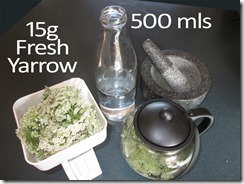It is always risky to recommend a food to others if you don’t research it thoroughly, and it is even riskier these days when so many are discovering they have fallen foul of an allergy or food intolerance.
Take, for instance: herbal teas. What innocuous little things are herbal teas? Lots of big names in the tea market sell herbs blended with common teas, or mixed herbs on their own – which are generally referred to as Tisanes.
Warning about Yarrow
In a recent blog post I shared my experiment with using Yarrow as a tea. And then, investigating other herbs today, I chanced upon a Wikipedia article on the effects of Herbal Teas. For instance: if you rushed out and gathered Yarrow and made tea after reading my blog post you might well have had an allergic reaction. Unfortunately I don’t know what allergic reaction. The article doesn’t state it. But then again people also have allergic reactions to pharmaceuticals that have gone through years of testing.
When the pharmaceutical industry was first starting it used herbs as the basis of all medicines. Herbs WERE medicine; they were simply popular cures dressed up with fancy labels or containers. Later, when scientists were able to identify and extract the active ingredient that cured, the industry developed synthetic substances that mimicked the effect of these herbs. It was about then that the pharmaceutical scientists unhooked their hands from the herbalists.
Now western medicine does not trust anything that hints of herb and generally labels it as quackery. But those same scientists still go back to analysing herbs/plants for the active ingredients that appear to fix the human body.
Bergamot and cholesterol
Take Bergamot for instance: I recently chanced on a report of a double-blind test of the fruit. Testing led by the University Magna Graecia in southern Italy and published in the International Journal of Cardiology, showed that the fruit could significantly help people reduce their cholesterol without taking drugs. What better way to prolong heart life than to eat an orange a day?
So I looked up what was available in the bergamot market and came across the BergaMet Mega website, which was offering capsules with this amazing juice dried out. The website, bless them, actually tells you the ingredients: “Each bottle contains 60 tablets which each contain 650mg of pure juice Bergamot dehydrated (entitled to 35% in composition of polyphenols) and 50 mg of ascorbic acid”. Of course, like any herbal (dare I say) medicine, there are a lot of get-out clauses and warnings.
I wonder if these warnings would be in such large print if a big pharmaceutical company had created a potion that mimicked the active ingredients in bergamot? Perhaps they have? Perhaps they’re called Statins?
As for me? I’m off to plant and carefully tend a Bergamot orange, if I can find one in New Zealand.
Heather Sylvawood, author of Searing Heat, a high country tale.
PS: Bergamot is thought to be a hybrid of sour orange and citron or lemon. The tress have been grown in the Mediterranean for several centuries. The tree is small to medium at maturity and thorn-less. The fruit is mostly round, with a little bit of a neck and a nipple, and they’re juicy.


